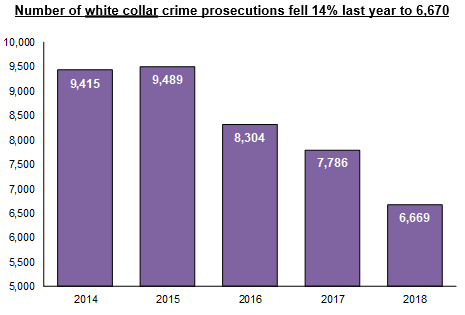White Collar Crime Prosecutions in UK Fall to Five-Year Low
The U.K. side of the Thomson Reuters Legal business recently released a study showing that white collar crime prosecutions fell to a five-year low.
White collar crime includes offenses such as fraud, money laundering, cybercrime and insider trading. Prosecutions in the U.K. were down 14 percent* to 6,670 last year, from 7,790 in 2017.
The drop may be due to several reasons, including cuts to police resources, which may have made investigating white collar crime cases more difficult. Also, fraud is becoming more sophisticated, often involving cross-border transactions across multiple jurisdictions. Investigating these cases can be time consuming and eat into already stretched budgets. In addition, criminals are exploiting advances in technologies, such as crypto-assets, to move money anonymously.
Unlike the fall in prosecutions for white collar crime, the number of reported fraud and computer misuse offenses was the highest on record. It increased 9 percent** last year to 693,420, up from 638,360 in 2017-18.
Charles Thomson, author of Practitioner’s Guide to The Law and Regulation of Financial Crime, published by Thomson Reuters, and a partner at Baker McKenzie, explained why falling prosecutions are producing growth in civil fraud and asset recovery work at law firms.
“Budget cuts are taking their toll on police forces, who are having to downsize fraud teams whilst fraud cases continue to rise,” Thomson explained. “The result is that police forces may not always have capacity to investigate complex fraud cases and are more likely to focus on the investigation of other offenses, which are likely to be less resource intensive.”
Thomson said these delays in criminal investigations increase the chances that stolen funds and assets will not be recovered, which has led many victims to choose the civil route, where a timely issuance of a court order makes recovery more likely.
He explained that civil proceedings enable victims to obtain interim orders from the court – such as asset freezing or disclosure and seizure orders – soon after fraud is discovered, which increases the chances that stolen assets will ultimately be recovered.
Several media outlets featured the Thomson Reuters research, including City A.M., The Times and Law Society Gazette.
*Ministry of Justice, 2019; year-end December 31
**Office for National Statistics, 2019
